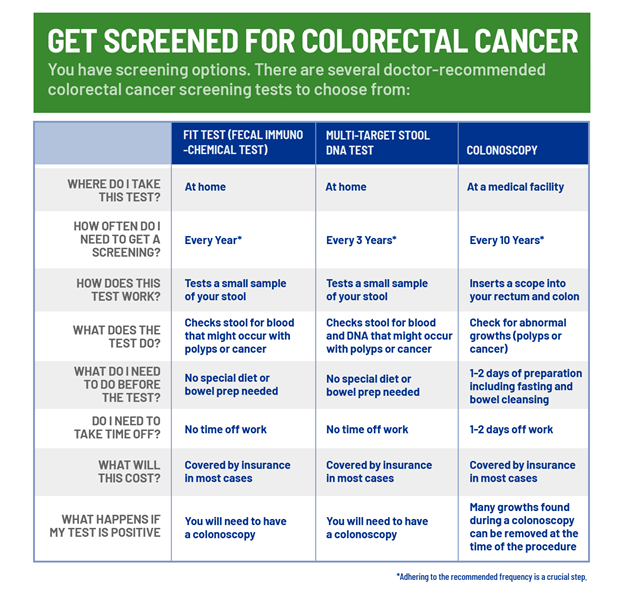Take Control and Get Screened for Colorectal Cancer
Detecting colorectal cancer early, when it is easier to treat, leads to better outcomes.
Colorectal cancer does not always cause symptoms, especially in the early stages of the disease before it spreads to other parts of the body.
The best way to protect yourself from colorectal cancer is to have regular screenings beginning at age 45, or earlier if your doctor recommends it.
Who Should Get Screened for Colorectal Cancer
The U.S. Preventive Services Task Force (USPSTF) recommends that people who are at average risk of colorectal cancer start regular screenings at age 45.
You’re at average risk if you do not have a:
- personal history of colorectal cancer or certain types of polyps
- family history of colorectal cancer
- personal history of inflammatory bowel disease, such as ulcerative colitis or Crohn’s disease
- confirmed or suspected hereditary colorectal cancer syndrome, such as familial adenomatous polyposis (FAP) or Lynch syndrome
- personal history of radiation to the abdomen or pelvic area
If one or more of these statements describes you, however, you should consider seeing a doctor right away to discuss having a colorectal cancer screening. Even those that appear to be healthy should continue regular colorectal cancer screenings at least through age 75, as underlying symptoms may go unnoticed. This is especially true if you’re Black or Latinx.
Screening Options
Colorectal cancer is easier to treat when it’s found early. That’s why screening is so important. The costs of colorectal cancer screening are covered by both private insurances and Medicare. That means you should not have to pay out-of-pocket costs, such as co-pays or deductibles.
How to Get Screened for Colorectal Cancer
Start by seeing the locations that offer colorectal cancer screening near you.

Actor’s Death Sheds Light on Colorectal Cancer
When “Black Panther” actor Chadwick Boseman passed away from colorectal cancer in 2020 at age 43, it changed the public perception of who is affected by the disease, shining a light on the rising rates of the cancer in young people — and the way it disproportionately affects the Black community.
A concerning increase in colorectal cancer incidence among younger individuals (i.e., younger than 50; defined as young-onset colorectal cancer) has been documented since the mid-1990s, with 11% of colon cancers and 15% of rectal cancers in 2020 occurring among patients younger than 50 years, compared with 5% and 9%, respectively, in 2010. In 2021, to combat the rising rates, the USPSTF lowered the age — from 50 to 45 — for people of average risk to have regular screenings.
Boseman’s death also highlighted incidence rates among Black people, who are about 20% more likely to get the disease and 40% more likely to die from it than most other groups.
Experts hope the heightened public awareness will lead more people to get screened for colorectal cancer.
Stand Up To Cancer (SU2C) Colorectal Cancer Health Equity Dream Team

One tool for increasing awareness around colorectal cancer prevention is a team of experts and advocates working to reach those most at risk of developing the disease — and educating them on the benefits of early screening.
The SU2C Colorectal Cancer Health Equity Dream Team, launched in 2021, addresses disparities surrounding the cancer. The team — a joint effort by SU2C, Exact Sciences and Providence — brings together leading researchers, patient advocates, community advocates and providers to help improve colorectal screening in medically underserved communities.

The national program is designed to help Black, Latinx and Native American communities within three specific SU2C ZonesTM: Greater Boston, Great Plains Tribal Communities and Los Angeles.
The program’s goals include:
- Identifying and funding community health organizations to increase awareness about screenings and improve research participation
- Working with health organizations to improve follow-up care
- Creating mentorship with young scientists, researchers and doctors
Learn more about SU2C’s Dream Teams, including the Colorectal Cancer Health Equity Dream Team.

Find a Primary Care Doctor
Our providers offer personalized care by focusing on treatment, prevention and health education.
Need care more immediately? Our Express and Urgent Care clinics offer fast access both in person and online.

It’s All in the Providence App
The Providence app gives you more ways to get care and access your medical records whenever you need.
- Schedule appointments
- Conduct virtual visits
- Receive updates from your care team
- View health records
Download the Providence App now!
Scan the QR code below.
